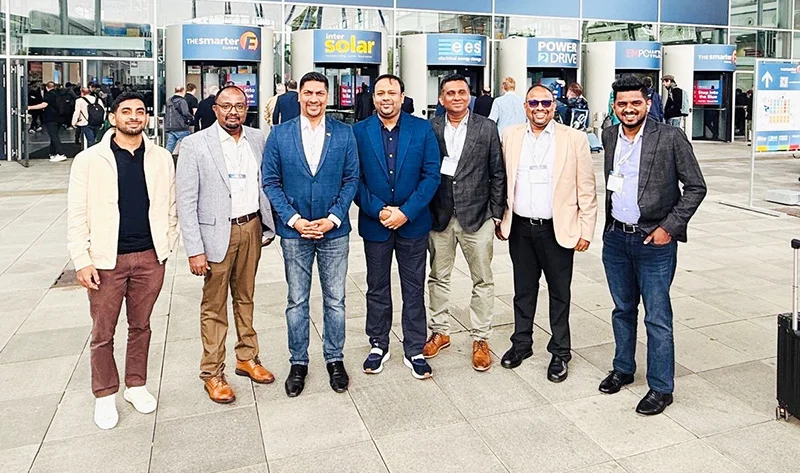Business
People’s Merchant Finance goes for right issue

By Hiran H.Senewiratne
Peoples’ Merchant Finance PLC will go for a right issue to raise Rs. 812 million to comply with the minimum capital requirement level under the Central Bank ruling. Under the right issue 11 new shares will be on offer for every 20 shares at Rs. 7.
Amid those developments the CSE was extremely bullish and touched the 8000 mark and the All Share Price Index went up by 280 points during the early part of the day. However, due to profit taking the ASPI’s momentum slipped and settled at 188.09 points.
The turnover stood at Rs. 12.2 billion with eight crossings. Both indices moved upwards. All Share Price Index went up by 188.09 points and S and P SL20 went up by 100.32 points.
The crossings were reported in Renuka Capital, which crossed 12.5 million shares to the tune of Rs. 102.5 million, its share price traded at Rs. 8.20, Kelani Cables 365,000 shares crossed for Rs. 66.6 million, its shares traded at Rs. 182.50, Expolanka one million shares crossed for Rs. 55.5 million, its shares traded at Rs. 55.50, Dipped Products 116,000 shares crossed for Rs. 50.1 million and its shares traded at Rs. 435. Meanwhile, HNB (Non Voting) 400,000 shares crossed for Rs. 44 million, its shares traded at Rs. 110, HNB (Voting) 265,000 shares crossed for Rs. 35.3 million, its shares registering a price of Rs. 133, JKH 190,000 shares crossed for Rs. 30.4 million, its shares traded at Rs. 160 and Commercial Bank 300,000 shares crossed for Rs. 26.4 million, its shares trading at Rs. 80.
In the retail market, top five contributors to the turnover were, Expolanka Rs. 1.6 billion (28 million shares traded), Browns Investments Rs. 1.36 billion (183 million shares traded), LOLC Rs. 1.3 billion (4.95 million shares traded), Access Engineering Rs. 796 million (27.8 million shares traded) and Dipped Products Rs. 400 million (940,000 shares traded). During the day 506 million share volumes changed hands in 65520 transactions.
Last Friday’s Rs. 12.4 billion turnover, the highest in a year, at the Colombo stock market is being credited by brokers to ‘near-pure retail play’, as investor sentiment gathered more momentum, spearheaded by high-net-worth individuals.
Business
World Bank may convert infrastructure loans into tradable assets

A game-changer for Sri Lanka’s capital market
As the global community convened for the World Bank Group’s 2025 Spring Meetings under the timely theme “Jobs: The Path to Prosperity,” one message stood out: prosperity in the developing world depends not only on physical infrastructure but also on strong financial systems.
Among the influential voices at this year’s gathering was Douglas L. Peterson, Special Advisor to S&P Global and a longstanding advocate of resilient market economies.
Drawing from a decade-long tenure as CEO of S&P Global, Peterson delivered key insights that resonate deeply with the challenges and opportunities facing emerging economies such as Sri Lanka.
Peterson stressed that while global capital is abundant, it doesn’t move indiscriminately. “It follows signals, namely, data, transparency, regulatory certainty, labour and market stability.”
“When investors look to deploy capital in developing markets, they’re seeking a solid financial infrastructure,” Peterson said. “That includes reliable data, transparent pricing mechanisms, independent credit rating agencies, and clearly defined bankruptcy laws.”
These factors may not make headlines, but Peterson underscored their essential role.
“Financial infrastructure enables confidence, and confidence attracts investment,” he said.
A key initiative Peterson is championing in collaboration with the World Bank is titled ‘Originate to Distribute’, a structured finance approach where loans are created by institutions like the World Bank but sold to private investors.
Traditionally, loans from development banks remain on their balance sheets for decades. This initiative proposes standardising and structuring such loans so that private investors can purchase, pool, and trade them – essentially converting infrastructure loans into a new, tradable asset class.
“This is about creating velocity and scale,” Peterson said. “If the World Bank can originate loans and distribute them to the private sector, every dollar stretches further. It helps close the multi-trillion-dollar infrastructure investment gap.”
For countries like Sri Lanka, where public finances are under pressure, such a model could unlock significant private capital provided the regulatory environment and financial infrastructure are prepared to support it.
In alignment with the World Bank’s focus on job creation, Peterson prioritised five sectors he believes are pivotal for employment growth in developing nations: infrastructure (both physical and digital), agri-business, healthcare, tourism, and manufacturing. The common thread across all these sectors, he asserted, is infrastructure.
“Build an airport and you get hotels, transport services and even carbon savings,” Peterson said. “A bridge not only connects communities but also cuts costs, travel time, and emissions.”
According to Peterson, infrastructure investment yields a multiplier effect, often generating an additional $1.40 to $1.60 for every dollar spent. It also catalyses other industries. Manufacturing depends on roads and ports; tourism needs transport and energy; agriculture requires logistics and storage; and healthcare relies on reliable access and communication systems.
Peterson’s reflections also touched on a more structural issue that Sri Lanka is currently facing; the need to develop robust domestic capital markets. He emphasised moving beyond a banking-dominated financial system toward one that includes institutional investors like insurance companies and pension funds.
“These institutions become long-term investors,” he noted. “They form the foundation for sustainable infrastructure investment. Homegrown capital reduces reliance on external debt and increases financial resilience.”
Peterson’s remarks serve as a timely reminder as job creation and long-term prosperity in Sri Lanka will not come through piecemeal efforts. Instead, they require coordinated investments in both physical and financial infrastructure, from better roads and ports to regulatory frameworks that inspire investor confidence.
Unlocking private capital through trust, transparency, and smart financial engineering is the way forward. And as leaders like Peterson have shown, the tools and models already exist. It is now up to policymakers and financial leaders in Sri Lanka to ensure Sri Lanka is ready to embrace them.
Douglas L. Peterson currently serves on the board of the UN Global Compact and was formerly CEO of S&P Global, where he expanded the company’s market capitalisation from $16 billion to over $150 billion. He also led the G7 task force on sustainable finance in 2021.
By Sanath Nanayakkare
Business
AHK Sri Lanka facilitates business delegation to Intersolar Europe 2025

The Delegation of German Industry and Commerce in Sri Lanka (AHK Sri Lanka) successfully organized a visitor delegation to Intersolar Europe 2025, held from 7 – 9 May in Munich, Germany. Recognized globally as one of the most significant and comprehensive trade fairs dedicated to the solar industry, Intersolar serves as a premier platform for showcasing the latest innovations in renewable energy and sustainable technologies.
The Sri Lankan delegation comprised senior representatives from prominent companies in the sector, including Mega Solar, Micro PC Systems, Eco Solar Rays, and Puwakaramba Building Solutions, reflecting the country’s growing commitment to advancing renewable energy solutions.
The primary objective of this visit was to provide Sri Lankan companies direct access to the latest developments in solar technology, including sustainable energy solutions, energy storage systems, e-mobility, floating solar applications, agrivoltaics and recycling solutions. By connecting local enterprises with cutting-edge technologies and global industry leaders, AHK Sri Lanka aims to facilitate the adoption of modern energy solutions in Sri Lanka and support the nation’s broader transition to a more sustainable and energy-secure future.
A key highlight of the delegation’s agenda was a strategic meeting with the organizers of Intersolar Europe. This engagement provided valuable insights into the exhibition’s future vision and fostered discussions on potential collaboration opportunities between German and Sri Lankan stakeholders in the renewable energy sector.
Further amplifying the value of the delegation, AHK Sri Lanka coordinated over 25 tailored B2B meetings between Sri Lankan companies and German/European industry counterparts. These curated matchmaking sessions enabled participants to explore commercial opportunities, initiate technical partnerships, and lay the groundwork for future investments and joint ventures.
Business
Prime Group appoints Umaria Sinhawansa as Global Brand Ambassador

Prime Group, Sri Lanka’s leading real estate brand with a 30-year legacy and international branches in Australia and Dubai, has named celebrated Sri Lankan music icon Umaria Sinhawansa as its Global Brand Ambassador. This partnership unites two Sri Lankan powerhouses to showcase local talent and excellence worldwide.
The collaboration aims to strengthen Prime Group’s global expansion while promoting Sri Lankan culture. Umaria, who bought her first property from Prime Group a decade ago, expressed pride in representing the brand. Prime Group’s Co-Chairperson, Sandamini Perera, highlighted Umaria’s embodiment of Sri Lankan heritage and global appeal, aligning with their mission to elevate the country’s real estate innovation.
Together, they aim to inspire trust, connect with international markets, and celebrate Sri Lanka’s cultural richness on a global scale.
-

 Features4 days ago
Features4 days agoSAITM Graduates Overcome Adversity, Excel Despite Challenges
-

 News4 days ago
News4 days agoDestined to be pope:Brother says Leo XIV always wanted to be a priest
-

 Sports4 days ago
Sports4 days agoASBC Asian U22 and Youth Boxing Championships from Monday
-

 Foreign News5 days ago
Foreign News5 days agoMexico sues Google over ‘Gulf of America’ name change
-

 Opinion4 days ago
Opinion4 days agoDrs. Navaratnam’s consultation fee three rupees NOT Rs. 300
-

 Features3 days ago
Features3 days agoChampioning Geckos, Conservation, and Cross-Disciplinary Research in Sri Lanka
-

 Business4 days ago
Business4 days agoDilmah – HSBC future writers festival attracts 150+ entries
-

 Business4 days ago
Business4 days agoBloom Hills Holdings wins Gold for Edexcel and Cambridge Education












